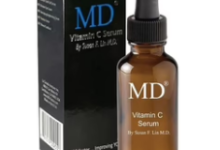The Holy Grail of skincare products, vitamin C, is usually included in people’s skincare regimens. Vitamin C is considered to be one of the most popular antioxidant substances.
It is not surprising that vitamin C serums, sheet masks, face creams, and other vitamin C skincare products, especially vitamin C serums for the face, have steadily made their way to shelves all over the world due to their ability to slow down the aging process of your skin and add a juicy glow to dull and lackluster skin.
But what specific advantages does vitamin C have for the skin? And which skincare items containing vitamin C should you include in your routine? Here is all the information you need to use vitamin C on your skin. Let’s take a look at them!
What Exactly Is Vitamin C?
A water-soluble antioxidant and nutrient called vitamin C help your skin look better and prevent free radical damage. When referring to skin, it is sometimes referred to as ascorbic acid and L-ascorbic acid. Your body also needs vitamin C for tissue development and repair.
It has been found that the human body does not naturally generate vitamin C. It needs to be consumed through various fruits and vegetables. Vitamin C is a nutrient that may be applied topically to the skin and is found in many skincare products. Your skin mostly benefits from vitamin C when applied topically in its concentrated form.
What Are the Top-notch Benefits of Vitamin C Serum?
How do we even start? It is challenging to pick just a few of vitamin C’s numerous skin-friendly advantages to include here because it is such a potent antioxidant. There is a wide range of benefits of vitamin C. Let’s take a look at them.
1. Vitamin C fights free radicals
Free radicals damage the dermis (the skin tissue that provides your skin its elasticity and strength), moisture barrier, cell functioning, and the texture and color of your skin. Sunlight, stress, pollution, UV radiation, and other environmental aggressors all cause free radicals to form in the skin. The antioxidant vitamin C targets and destroys these free radicals while protecting the skin from outside aggressors.
2. Vitamin C for Anti-aging
Vitamin C has a major role in collagen synthesis in your body. Your body gets shape from the protein collagen, especially your skin. Your body’s production of collagen tends to decline as you age, causing your skin to sag and lose its firmness and elasticity.
As you become older, fine lines and wrinkles grow on your face, giving you an aged and worn-out appearance. Vitamin C, a natural collagen booster, improves your skin’s elasticity, texture, and quality.
3. Vitamin C Hydrates Dry Skin
Vitamin C and its derivatives have been demonstrated to have moisturizing qualities and to reduce trans epidermal water loss, strengthening your skin’s moisture barrier and preventing moisture loss from the skin’s surface.
4. Vitamin C makes you look younger
One of vitamin C’s most well-known benefits is arguably its capacity to brighten skin. It is obvious that UV rays and pollutants have affected the skin since it seems dull, worn down, and lackluster.
Vitamin C functions as a brightener to enhance the appearance of dull skin by giving you an even brighter complexion and a true inner glow. Vitamin C-containing skincare products, especially concentrated vitamin C serum for the face, quickly evens out skin tone and provide a healthy glow to the complexion, giving the skin a youthful appearance.
5. Vitamin C Lowers Hyperpigmentation and Black Patches
The brightening properties of vitamin C also include its capacity to lessen hyperpigmentation and brighten dark areas. By blocking the pathway that leads to the abnormal development of skin pigments, vitamin C reduces the appearance of dark spots, sun spots, acne scars, pimples, and hyperpigmentation brought on by melasma (melanin). Black spots can be reduced with the use of vitamin C’s unique anti-spot property without affecting the color of your healthy skin.
How To Use a Vitamin C Serum
Vitamin C is usually well tolerated, but all skin care treatments can have adverse effects.
A patch test should always be performed to determine allergy risk. Here’s how:
- You need to select a small section of skin, just like you did on your forearm.
- Wait for about 24 hours after applying a small amount of product.
- It may be applied to the face as long as there are no negative side effects. Follow product label directions for a complete application.
New cosmetics may cause skin reactions with repeated use, so it is advisable to introduce them one at a time, separated by several weeks. Usually, vitamin C serum is applied once or twice daily. Some of the most common guidelines include cleansing, tone, applying vitamin C serum, and moisturizing. Always make sure that your hands are clean before you apply any skin care product.
It is safe to combine it with other active substances, but doing so may reduce the effectiveness of vitamin C-containing products. Tyrosine, zinc, and vitamin C together were found to boost the bioavailability of vitamin C 20 times more than vitamin C alone, according to a review from 2020.
Verify the use-by date on your goods. Vitamin C has been mostly oxidized if the product has darkened or otherwise has been found to change its color. However, the product doesn’t offer the same benefits even though it is still quite safe to use.
Potential Side Effects and Risks
Before using the product fully, you should always perform a patch test, even though irritation is unlikely. The only way to know how your skin will respond to the serum is to do this step most importantly.
Wrapping Up
If you are in search of a brand that can serve you with some of the most reliable anti aging cream for sensitive skin, then MD is what you need. Their top-notch vitamin c serum anti aging is quite hard to miss.
Dig deep into their website and learn more about the brand!



